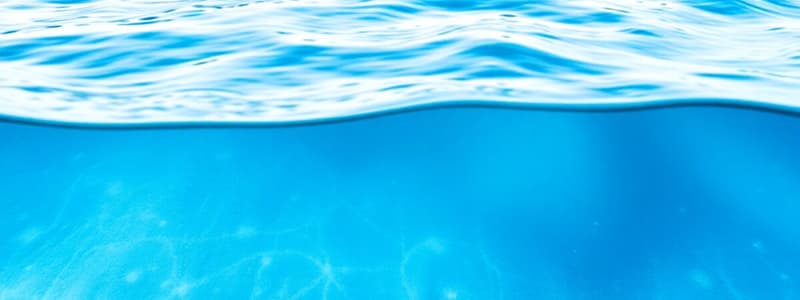Podcast
Questions and Answers
What property of oceans allows them to absorb and store carbon dioxide effectively?
What property of oceans allows them to absorb and store carbon dioxide effectively?
- Low salinity
- High evaporation rates
- Biomass concentration
- High heat capacity (correct)
Which statement regarding ocean water temperature is accurate?
Which statement regarding ocean water temperature is accurate?
- Temperature decreases as water moves toward the equator.
- Temperature is highest at the equator. (correct)
- Ocean water heats up quickly compared to air.
- Ocean water temperature is uniform across the globe.
Why does ocean water freeze at a lower temperature than freshwater?
Why does ocean water freeze at a lower temperature than freshwater?
- Higher pressure in the ocean.
- Increased salinity lowers freezing point. (correct)
- Presence of aquatic life forms.
- It contains more thermal energy.
What primarily affects the density of ocean water?
What primarily affects the density of ocean water?
How does the salinity of ocean water affect its freezing point?
How does the salinity of ocean water affect its freezing point?
Which conclusion can be drawn about cold, salty water in the ocean?
Which conclusion can be drawn about cold, salty water in the ocean?
Which characteristic of ocean water affects its ability to release heat?
Which characteristic of ocean water affects its ability to release heat?
What is the primary reason ocean water is not suitable for drinking?
What is the primary reason ocean water is not suitable for drinking?
Where does most of the salt in the oceans originate?
Where does most of the salt in the oceans originate?
What effect can nitrogen-contaminated runoff from farms have on ocean plants?
What effect can nitrogen-contaminated runoff from farms have on ocean plants?
Which of the following gases is NOT commonly dissolved in ocean water?
Which of the following gases is NOT commonly dissolved in ocean water?
What happens to the salinity of ocean water as water evaporates?
What happens to the salinity of ocean water as water evaporates?
What is a major consequence of excessive plant growth in the ocean caused by nitrogen runoff?
What is a major consequence of excessive plant growth in the ocean caused by nitrogen runoff?
Which of the following best describes the structure of ocean water?
Which of the following best describes the structure of ocean water?
Which of these chemicals is considered a main component of ocean water?
Which of these chemicals is considered a main component of ocean water?
Flashcards
Salinity
Salinity
The amount of salt dissolved in a given amount of water.
Source of ocean salt
Source of ocean salt
Most of the salt in oceans comes from rocks on land, dissolved by rain and rivers, and carried into the ocean.
Concentration of ocean salt
Concentration of ocean salt
As water evaporates from the ocean surface, salt is left behind, making the ocean water even saltier.
Layering of ocean water
Layering of ocean water
Signup and view all the flashcards
Freezing point of ocean water
Freezing point of ocean water
Signup and view all the flashcards
Ocean water chemistry
Ocean water chemistry
Signup and view all the flashcards
Dissolved gases in ocean water
Dissolved gases in ocean water
Signup and view all the flashcards
Impact of fertilizer runoff
Impact of fertilizer runoff
Signup and view all the flashcards
Ocean Carbon Sink
Ocean Carbon Sink
Signup and view all the flashcards
Ocean Water Temperature
Ocean Water Temperature
Signup and view all the flashcards
Ocean Heat Capacity
Ocean Heat Capacity
Signup and view all the flashcards
Ocean Water Freezing Point
Ocean Water Freezing Point
Signup and view all the flashcards
Ocean Water Density
Ocean Water Density
Signup and view all the flashcards
Salinity and Density
Salinity and Density
Signup and view all the flashcards
Temperature and Density
Temperature and Density
Signup and view all the flashcards
Study Notes
Ocean Water Properties
- Ocean water covers about 97% of Earth's water.
- It is too salty to use for drinking, cooking, or watering plants.
- Salinity is the amount of dissolved salts.
- Salt originates from land via rain and rivers, dissolving minerals like sodium chloride.
- Undersea volcanoes also contribute salts.
- Salt concentration increases as surface water evaporates.
- Ocean water also contains other chemicals like magnesium, sulfate, calcium, and potassium.
- Dissolved gases include nitrogen, oxygen, and carbon dioxide.
- Nitrogen in fertilizer runoff can cause excessive plant growth, depleting oxygen for other marine life.
- Oceans absorb and store carbon dioxide, reducing greenhouse gases and affecting climate change.
Ocean Water Temperature
- Ocean temperatures vary based on latitude, highest at the equator, and coldest near the poles.
- Ocean water has a high heat capacity compared to air; it takes more energy to change its temperature.
- It takes time to heat up and cool down.
- Ocean water's freezing point is lower than freshwater, about 28°F (compared to 32°F).
- Salinity affects the freezing point; more salt lowers the point.
Ocean Water Density
- Density is the relative weight of water.
- Density depends mainly on temperature and salinity.
- Saltier and colder water is denser and sinks.
- Less salty and warmer water is less dense and floats.
- Different density layers form in the ocean.
Studying That Suits You
Use AI to generate personalized quizzes and flashcards to suit your learning preferences.




